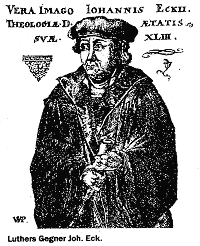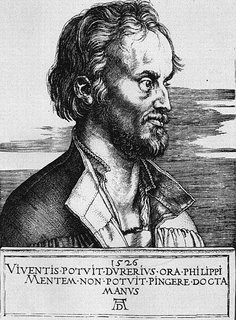

After the famous debate between Luther and John Eck, Melanchthon commented that the debate was an “attempt to distinguish the early theology of Christ from the recent Aristotelian innovations of scholasticism.”
In the debate, Eck had relied on the church fathers rather than on the Scriptures. The early reformers though were committed to only one ultimate authority: the sacred Scriptures. In a response to Eck after the debate, Melanchthon stated:
“I greatly revere the historic leaders of the church, those illustrious vindicators of Christian doctrine. However, the holy fathers often have conflicting views, and when they do, they are to be judged by Scripture, not vice versa. Sacred Scripture has a simplicity and unity that can be comprehended by anyone who will carefully follow the text. For this reason, we are told to search the Word. It is an anvil on which to test the doctrines and views of men.
All of us interpret Scripture differently, because we have had different experiences and feelings. As the polyp reflects the color of the stone to which it clings, so we strive to conform our prejudices, first this and then that interpretation pleasing us. Frequently we get the right meaning and sincerely pursue a proper course, but we are diverted, too, sometimes quite unconsciously. So it was with the Fathers. Their emotions often led them astray, and they abused the Word, interpreting it not necessarily maliciously but inappropriately.”
The scholastics have turned Scripture into a Proteus, a sea god who can change at will; they have metamorphosed the Word of God into a word of man. But why go on? The divine canonical Scriptures alone are inspired and true and pure in all things.”
Source: Clyde Manschreck, Melanchthon The Quiet Reformer (New York: Abingdon Press, 1958), 50-51.






3 comments:
Hello Anonymous,
The Sorborne did not hand down a judgment on the Luther/Eck debate until 1521. It did not declare a winner. Eck thought he won, Luther thought he won. Neither admitted defeat. To my knowledge, Luther never publicly debated a Roman Catholic again because he was deemed an outlaw by the empire and a heretic by the RCC. He did engage in a written debate with Erasmus, a Roman Catholic, and both Catholic and Protestant scholars generally find his Bondage of the Will a masterpiece. The work is so popular, it’s still in print. Luther also wrote a handful of works against the treatises of other Roman Catholic scholars, I’m assuming you could consider these a type of “debate.”
In regards to whether or not protestant scholars and professional apologists get “cut to shreds” in written debates- this seems highly subjective. An example would be helpful. What are you basing this on?
Many of the current popular RCC apologists were Protestants, with excellent verbal skills- like Staples, Matatics and Sungenis. Even Pacwa is a professional speaker. These men repeatedly fair poorly in most cases when debating James White.
Hi,
Is there anyway to get a copy of any of the debates of Luther or Melanchthon vs. Eck.
Thank you,
Jeff
Try google books.
In the English Luther's works set, Luther reviews the debate.
If I recall, there are more extensive notes of the debate in Latin.
Post a Comment